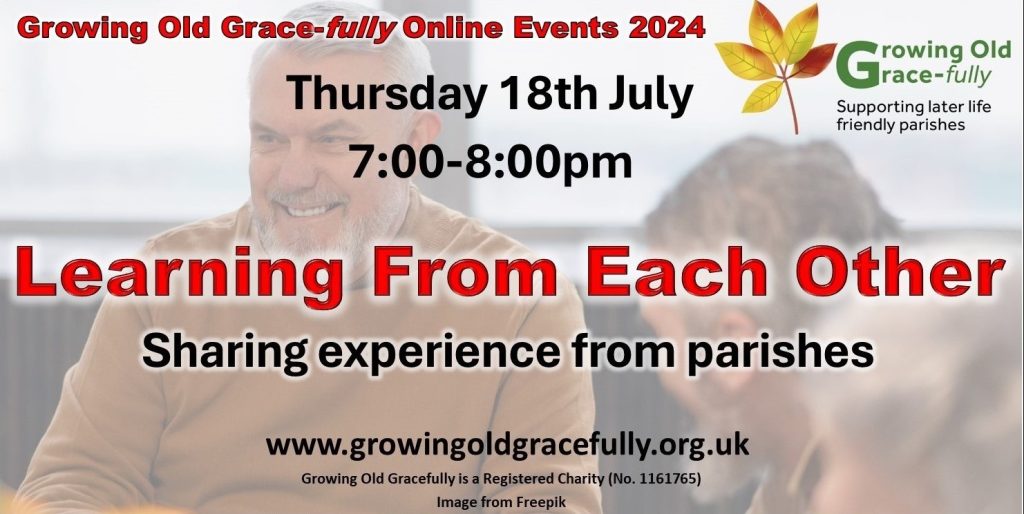| The third of Growing Old Grace-fully‘s 2024 online sessions is Learning From Each Other: Sharing Experience from Parishes on Thursday 18th July, 7:00-8:00pm. This session is about hearing examples of great work already happening, with contributions from: * Maureen Connolly from Immaculate Heart Parish, Huddersfield * Breda Theakston from the Elizabeth Prout Centre, talking about Bereavement support * Andrew Winfield from St John Vianney Parish, Leeds There will also be breakout groups to share other experiences and ideas as to how to enhance the spiritual life of older people in your own parish community and lives. The session will start and finish with prayer and reflection led by Rev. Joe Cortis, who is a Growing Old Grace-fully trustee. The session will start at 7pm and at 8pm, a Zoom link will be circulated to all attendees and the waiting room will be open from 6:55pm. To reserve your place, please book a free ticket on Eventbrite here. |
Category: Death and Dying
Places still available on last 2 events – ‘A Matter of Life and Death’-
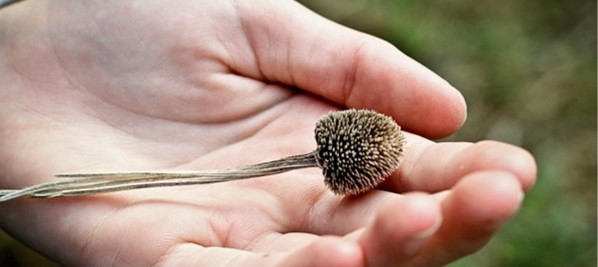
Our first 2 events went very well, with nearly 60 people at the excellent Webinar with Lynn Bassett , and over 20 at the first Discussion session, which gave rise to rich sharing in our break out groups.
This series is aimed at providing opportunities to talk openly about the subject of death and dying, rather than avoiding it as a taboo topic. We feel this is even more important in the wake of the devastating effects of the Covid-19 global pandemic during recent months.
The events are being organised and run as a partnership between Leeds Church Institute, Faith in Elderly People and Growing Old Grace-fully.
Here are the details of the events:
- Tues 20th October 10.30-11.30am ‘A Matter of Life and Death’ -seminar with Dr Lynn Bassett LISTEN TO THE RECORDING OF THIS EVENT HERE
- Tues 3rd November 10.30 -11.30am ‘Let’s Talk about Death and Dying’ – facilitated discussion
- Tues 17th November 10.30 – 11.30am ‘Memorialising and Funerals’ – facilitated discussion
- Tues 1st December 10.30 – 11.30am ‘End of Life Pastoral Care and Visiting’ – facilitated discussion
All are welcome at these online events; you may find them particularly helpful if you are supporting, visiting or caring for older people, the bereaved, or those nearing the end of life.
Format for the Events
We will kick off the series with a seminar type event with Dr Lynn Bassett being interviewed by Carol Burns, followed by opportunity to post questions in the chat function. This event can host a greater number of attendees.
The following 3 events will give more opportunity for discussion, and so may need to be limited to 30 people per event; if the events are oversubscribed we will keep a waiting list and consider planning further dates.
You can pick and choose which events to attend, there is no obligation to attend all 4 events as they are each stand-alone events in their own right.

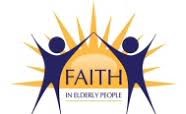

Is there a better way to die?
This interesting article from the Guardian explores the subject of drawing up end-of-life wishes and how the virus may be changing our attitude to death.
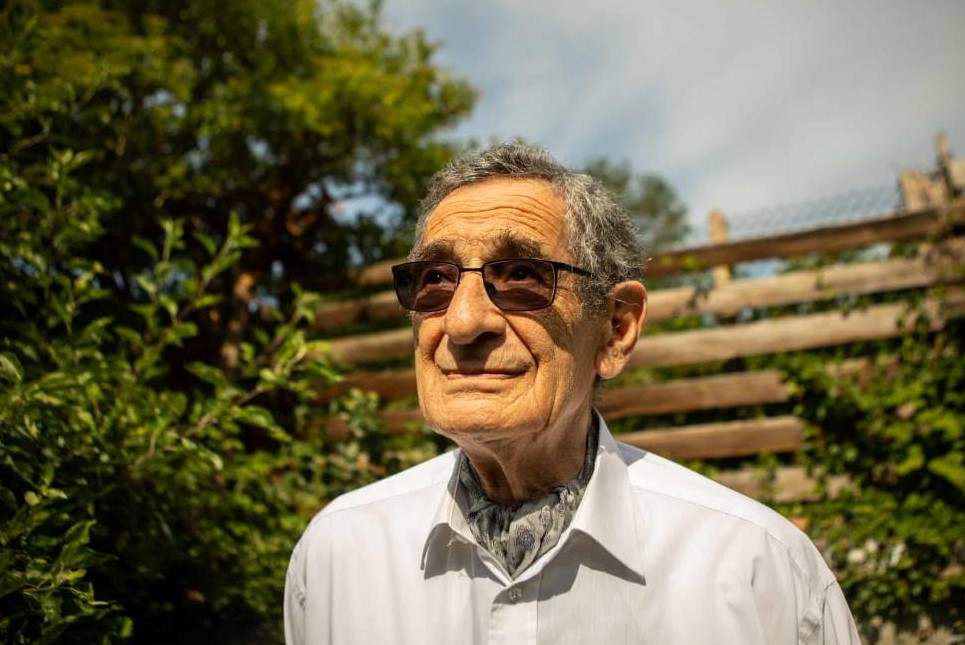
Peter Hallgarten, who survived a serious case of coronavirus. He and his wife decided 10 years ago to put together their end-of-life wishes (living wills), including a DNR (do not resuscitate order).
The article sates: ‘…Suddenly, death is all around … Everyone knows someone who has been touched. As a result, people are not only having intimations of their own mortality; more of them are thinking about how they want to die; of what they want to avoid in the way of intervention and what they would hope for, too, given the choice. Interest in advance directives, the documents often referred to as living wills, has grown dramatically during the pandemic….’
For more information on end-of-life wishes and related issues, see the websites below:

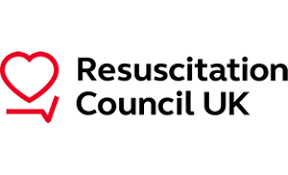
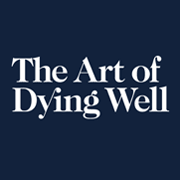
New Grief and Loss Service
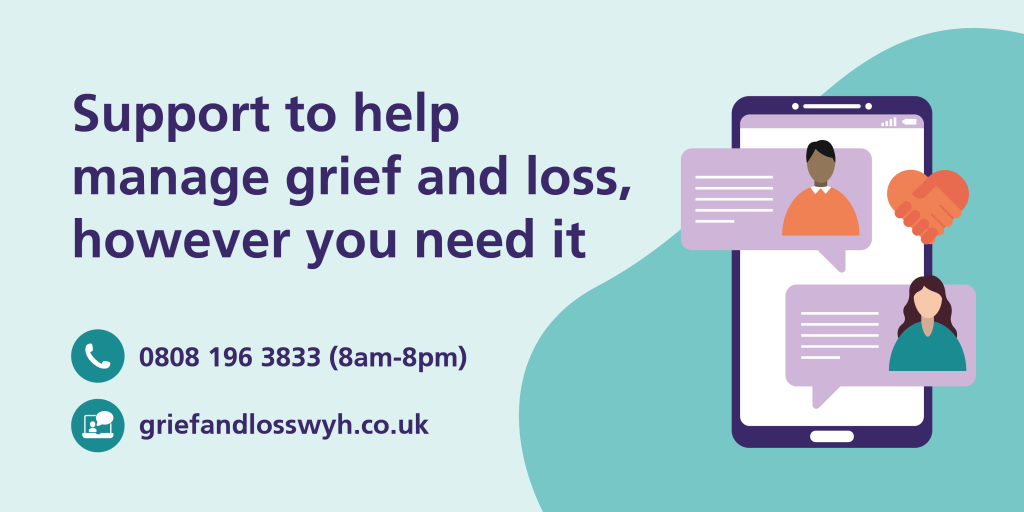
A new support and advice service is being launched to help people across West Yorkshire and Harrogate through grief and loss.
‘Practical and emotional support and advice is available from 8am to 8pm, 7 days a week via our freephone number 0808 1963833, or online chat facility. Our team can offer support and help connect you with organisations local to you, who can offer additional help where needed’.
The free service, commissioned by West Yorkshire and Harrogate Health and Care Partnership, will be delivered by West Yorkshire and Harrogate Independent Hospices Consortium, Bradford Counselling Collaborative and Leeds Mind.
Do contact the service if you:
- are suffering any form of grief and loss
- are worried about losing someone, whether this relates to a family member, friend or member of their community
- have been unable to see a loved one in their illness or final days
- are feeling impacted by the volume of deaths across the country or other aspects of the virus
- suffering loss not directly linked to the virus
Ring for free on 0808 1963833
Contact through the online chat facility
Living and Dying Well – some useful websites and books
As we are not able to run the conference at this time, we thought we would remind you of some useful websites and books on the topics of living and dying well. We hope you benefit greatly from exploring this content.
Useful Websites for your perusal:
The Art of Dying Well: https://www.artofdyingwell.org/
This excellent website based on an ancient Catholic tradition called Ars Moriendi offers practical and spiritual support to anyone faced with the prospect of death and dying, including helpful articles and videos.
Christians on Ageing: https://christiansonageing.org.uk/
A resource for churches: a voice for older people and their life of faith and hope. Interesting articles and up to date news.
Dying Matters: https://www.dyingmatters.org/
Well known website and movement to help people talk openly about dying, death and bereavement.
Sue Ryder: https://www.sueryder.org/
Scroll down on the home page to find their useful publication ‘A Better Death’.
A few recommended books for further reading:
If you click on the title it will take you to where you can read more about the book or purchase it if you wish.
Between Living and Dying: Voices from the Edge of Experience – Ruth Scott
Dear Life: A Doctor’s story of Love and Loss – Rachel Clarke
With the End in Mind: How to Live and Die Well– Kathryn Mannix
The Gift of Years: Growing Older Gracefully – Joan Chittister
God, Me and Being Very Old – Keith Albans and Malcolm Johnson
A GOOD DEATH – reflections from a former hospice chaplain, Revd Tom Lusty
Revd. Tom Lusty, LCI member and Vicar at St Giles, Bramhope reflects on ministry spent as a full-time hospice chaplain in the context of Covid-19.
Given the five years I spent inhabiting a hospice on a more or less daily basis I now know that death isn’t all that bad. It can sometimes be protracted and exhausting for all concerned. But even in such circumstances a good death is possible. With a good death there is a tangible sense of completeness, of dying with integrity.
To be honest I did not spend a great deal of time talking about death at the hospice beyond using euphemisms for it. For some of the nurses heaven was their euphemism of choice for death: “Gladys has gone to heaven now – God help them all up there”. I did speak, however, about my Christian faith when invited to do so, and the opportunities that came my way to speak about resurrection hope were considerable.
Within our tiny specialist world hospice chaplains have developed a repertoire of material that enables people to prepare spiritually for their own dying. Three resources that were and remain helpful to me are Mud and Stars, which gave me the theology, Tom Gordon’s A Need for Living which gave me the metaphors, and John O’Donohue’s Benedictus which gave me everything else: when there is nothing else you can do, you can always bless. That is a powerful thing to be left with – if you can bless sublimely, even better.
Dying is not about so much anguish and forsakenness. A good death is a movement towards integration – from “dislocation to relocation, from disorientation to re-orientation, from disintegration to re-integration” as Mud and Stars puts it. Part of a wider crucifixion/resurrection dynamic where we are always on the lookout for resurrection.
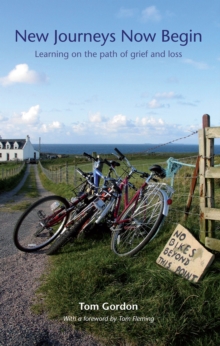
The cover photo of a book by Tom Gordon entitled New Journeys Now Begin depicts the access path to north beach on the Island of Iona. The inscription reads “No bikes beyond this point”. For each of us there will come a point where we have to relinquish the bike to go on the next stage of the journey. Getting off the bike can be painful because we get used to cycling everywhere. The more in life we can put the bike down and enjoy the view, the better prepared we will be for that moment in life when we will each have to “say goodbye to the bike”. As it were. This is a metaphor. A metaphor for resurrection.
As well as using metaphors a lot a group of hospice chaplains adopted a mnemonic as a helpful way into conversations about dying. The HEALER model goes like this:
H is for Hope – what takes people in a trajectory away from despair.
E is for Exploring Feelings – encouraging people to articulate their feelings.
A is for Adjustment to Loss – exploring how significant loss is transcended.
L is Looking Back – doing a life review: anything significant left unresolved?
The E and the R stand for Existential and Religious issues – some people are terrified of death for reasons that go beyond fear of the physical process of dying. I put that under ‘Existential’. Religion comes last of all. That is healthy because it says not all our needs are religious ones. We may choose to express our grounds for hope in religious terms but never exclusively so.
The HEALER mnemonic provides us with six different prompts as a helpful way into a conversation about dying. These prompts are not to be tackled exhaustively in chronological order (imagine how awful that would be) but rather as a means of focussing on some of the ways in which the conversation might go.
Given that Easter this year coincides with the beginning of the six to eight week peak of the Covid-19 pandemic in the UK using prompts from this mnemonic might be helpful during that time if we wanted to reflect on our own mortality. Devoting a little space to reflect on our own dying (say ten minutes, once a week) will certainly make us more open to engage with others who may be starting out on the process of the end of life’s journey.
When someone asks “what hymns are you having for your funeral?” a closed response “goodness, I have never thought of that” may not always be adequate. A more open-ended, personal response to the question might well allow the questioner to fulfil a need to talk openly about death.
In any Christian model of spiritual preparation for dying you can’t leave out the letting go …and the leaping. John O’Donohue describes the daily handing over of one’s life as the act of awakening and surrender. The possibility of this daily practising of such a hand over, however we may choose to do it, of our lives into the life of God may well be what makes us most Christ-like.
Each morning we awaken to the light… each night we surrender to the dark… Awakening and surrender: they frame each day and each life; between them the journey where anything can happen.
John O’Donoghue, Anam Cara
The HEAL(ER) mnemonic was devised by Revd Linda Elliott, at one time Chaplain at Thorpe Hall Hospice in Peterborough.
Books mentioned in this article:
Mud and Stars: The Report of a Working Party on the Impact of Hospice Experience on the Church’s Ministry of Healing
A Need for Living: Signposts on the Journey of Life and Beyond Tom Gordon and New Journeys Now Begin Tom Gordon
Benedictus: A Book of Blessings John O’Donohue
Anam Cara John O’Donohue
POSTPONED “A Matter of Life and Death” conference Weds 18th March
PLEASE NOTE THAT THIS CONFERENCE HAS BEEN POSTPONED. WE HOPE TO REARRANGE IT FOR THE AUTUMN. A day to talk more openly about dying, death and bereavement.
This free conference aims to help us see dying as something we can plan for and manage rather than something to fear and avoid discussing. It is a partnership event organised by Growing Old Grace-fully, Faith in Elderly People and Leeds Church Institute.
Programme for the day
10.00am Arrival, opportunity to browse marketplace of informative stalls
11.00am ‘Can we talk about death?’ – facilitated discussion groups for all
12.00pm Keynote speaker Dr Lynn Bassett
‘Making those difficult conversations just a little easier’
1.00pm Lunch
2.00pm Workshops – first round.
You will be able to choose one from the following:
Palliative Care – Medical Mythbusting
Putting Affairs in Order – Financial and Legal
Funerals and Memorialising
Supporting Carers
Having the conversation – visiting and pastoral care
3.00pm Workshops -second round
(opportunity to attend another of the topics from the above list)
4.00pm Close
Soul Midwives
If you didn’t see it when first published then this is an interesting article to read about death and dying.
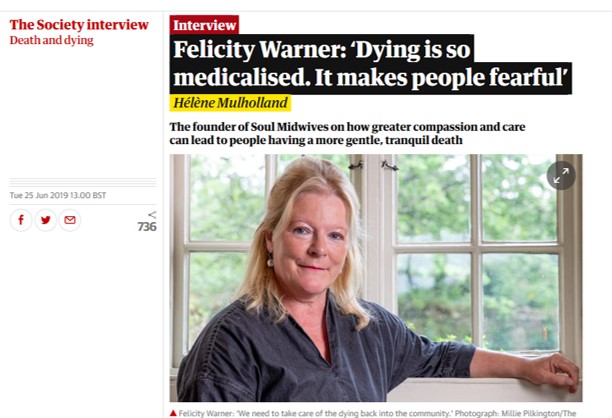
https://www.theguardian.com/society/2019/jun/25/soul-midwives-felicity-warner-end-of-life-care
Learning about what a ‘Good Death’ might involve
It’s been said that death is the last taboo and certainly in our heavily medicalised approach to dying we seem to have lost some of our skills for dealing with the end if life.
How many people have seen a dead body, how many people have been with someone who is in the last few days of life?
It may be that it’s only when someone very close to us approaches death that we have those experiences, often for the very first time.
I would hope that when I am in the last few months of life I have the support of a palliative doctor (or “deathwife”),such as Kathryn Mannix. She spent her days with the terminally ill and their families, witnessing and supporting them at times of intense suffering, terror and loss. About a quarter of deaths are sudden and unexpected, but she saw the ones that come slowly, over months or years, and while much of her work was diagnostic and medical, one of her crucial tasks was to help those who are dying and their families find ways of dealing with life’s final, great event.
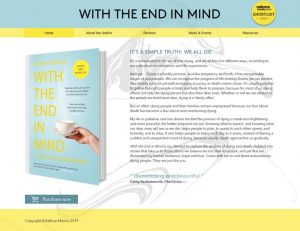 Mannix has recently retired and her book from 2018, With the End in Mind: Dying, Death and Wisdom in an Age of Denial is a treasure trove of stories about the end of life for a great variety of people, men and woman young and old. Mannix tells their stories with compassion and love. She talks about the different strategies she uses to help people make the right choices for them in their as they approach death and in doing so points us in the direction of the decisions we may need to make.
Mannix has recently retired and her book from 2018, With the End in Mind: Dying, Death and Wisdom in an Age of Denial is a treasure trove of stories about the end of life for a great variety of people, men and woman young and old. Mannix tells their stories with compassion and love. She talks about the different strategies she uses to help people make the right choices for them in their as they approach death and in doing so points us in the direction of the decisions we may need to make.
She never judges and is clear that people make many different choices, but she wants people to have the support to make choices so that there death be as good as they wish it to be.
The book is compulsive, I couldn’t put it down, I cried and I laughed with the people she worked with. I recommend it to anyone of any age and by recommending it to other family members it’s a good way to start those very difficult discussions about your last wishes.
Visit her website for more information.
A natural end – can a frank discussion of dying feel helpful?
As we age, or as our health deteriorates, we can make plans for what treatments we would wish to avoid or where we would like to be cared for. In a recent edition of The Tablet (26th May 2018), a palliative medicine pioneer explains that it’s often a surprise to patients and families that a frank discussion of dying can feel so helpful.
When I was working for MHA, a key part of the work of the Chaplaincy team in MHA Care Homes and Independent Living communities was the development of “The Final Lap” – a programme to train staff to support residents and their families as they explore what the last days of life will mean for them. My initial reaction at the time was shock, and the thought came to me “who wants to think about this?”. I came to realise this is my own fear talking, my own denial about a process that is as natural as birth. What I came to understand is that it it possible to respond to planning our dying in a positive and creative way. “The Final Lap” philosophy is based on 3 key principles:
- Create a culture that faces the reality of death openly, as part of human life, and to deliver support that makes it a more positive experience for everyone.
- Different people have different ideas about what makes a ‘good death’, so preparation and planning based around the individual’s wishes are important.
- Supporting someone who is dying can be difficult, but it can also be very rewarding. Final Lap training will help staff identify and address their support needs more effectively.
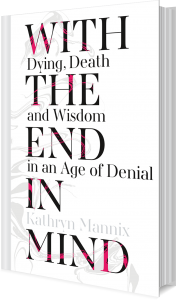 The Tablet article tells the true story of Ignatio, a man who is coming to the end of his life and finds relief and freedom in being able to talk about what he would like and, importantly, not like as part of his Advance Care Planning. The full article is behind a paywall here , and details about the author, Kathryn Mannix, and her latest book can be read here .
The Tablet article tells the true story of Ignatio, a man who is coming to the end of his life and finds relief and freedom in being able to talk about what he would like and, importantly, not like as part of his Advance Care Planning. The full article is behind a paywall here , and details about the author, Kathryn Mannix, and her latest book can be read here .
Our parishes have an important role in helping us ‘pack for the journey’. The Church offers hope and comfort because it is rooted in the belief that God made us to enjoy eternal life with Him. We are blessed with some special prayers and sacraments that give meaning to sickness and death.
Growing Old Grace-fully are thinking about offering a short session to parish groups on planning your Catholic funeral. This session will also offer the opportunity for people to start to explore some of the deeper questions and considerations for a parish in helping people think about their own end of life wishes. Is this something you think your parish might be interested in? Please get in touch with Rachel at growing.old.gracefully@dioceseofleeds.org.uk or call 07702 255142 for a chat.

